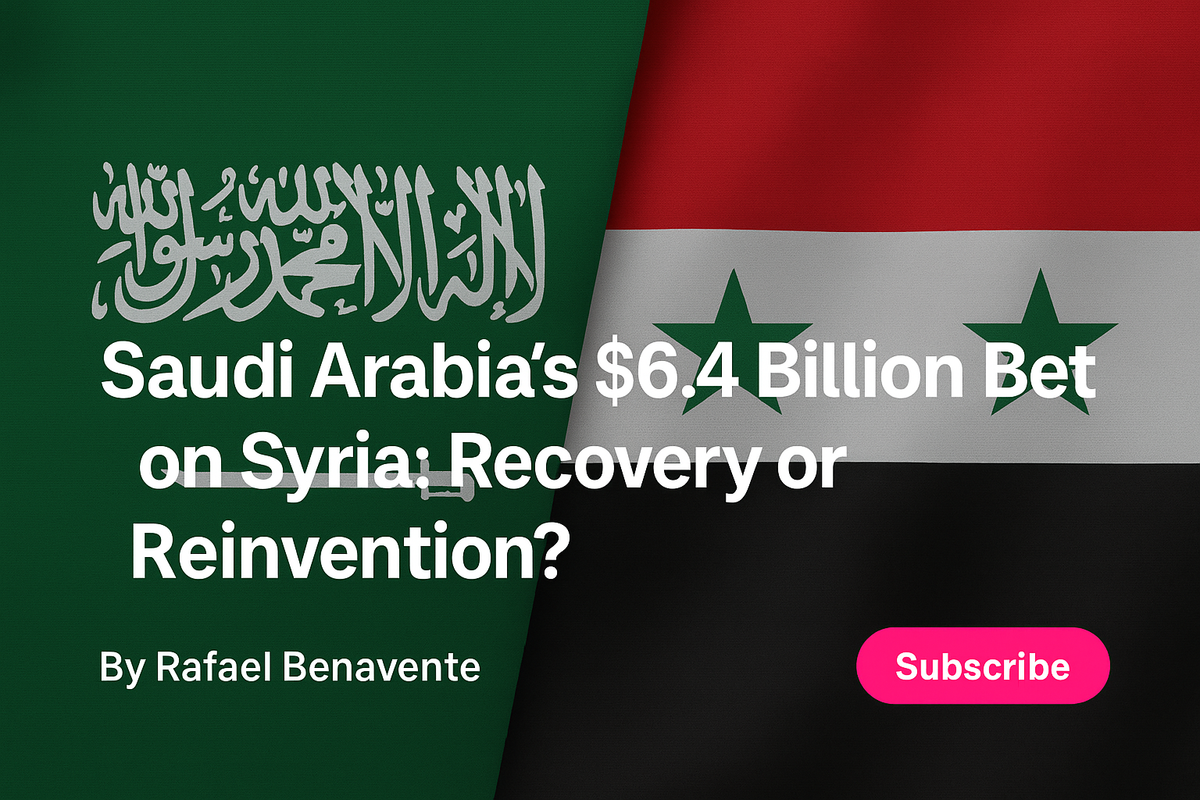Saudi Arabia Invests in Syria — But Is Assad’s Family Still in Charge?
Syria’s economy is being secretly reshaped, and the man in charge isn’t the president — it’s his brother. -Rafael Benavente

Saudi Arabia’s $6.4 Billion Bet on Syria: Recovery or Reinvention?
By Rafael Benavente
July 24, 2025
Saudi Arabia has announced a stunning $6.4 billion investment package in Syria — a move that signals both a diplomatic turning point and a high-stakes economic gamble. But beneath the glitzy press releases and investment agreements lies a more complex reality: Syria’s economy is being secretly reshaped, and the man in charge isn’t the president — it’s his brother.
This blog explores what Saudi Arabia’s reconstruction push really means in the context of Syria’s post-war restructuring, as revealed in two groundbreaking reports from Reuters and Reuters Investigates.
🏗️ The $6.4 Billion Lifeline: What’s In It?
Saudi Arabia’s investment includes:
- $2.9 billion in real estate and infrastructure
- $1.07 billion in telecom and digital services
- 47 commercial agreements signed by over 100 Saudi firms
- A joint Saudi–Syrian Business Council
These funds are earmarked for housing, telecom, hospitality, agriculture, health, and transport — all sectors devastated by over a decade of war. The goal? Rebuild Syria’s economy and re-anchor the country into the Arab fold under the leadership of interim president Ahmed al-Sharaa.
Yet, this rebuilding isn’t happening in a vacuum.
🕴️ The Shadow Architect: Maher al-Assad
While the West sees al-Sharaa as Syria’s new reformist figurehead, the Reuters investigation reveals that Maher al-Assad — brother of the ousted Bashar al-Assad — is orchestrating Syria’s economic future from behind the scenes.
🔍 Key Findings:
- Maher chairs the Economic Steering Committee, a secretive body with veto power over contracts, business licenses, and foreign deals.
- The committee controls billions in public assets, including natural resources and telecom revenue streams.
- Crony capitalism is rampant: contracts are funneled through loyalist networks tied to Maher and the Republican Guard.
This shadow economy may directly intersect with Saudi investments, raising concerns about where the money is truly going.
🇸🇦 Why Is Saudi Arabia Doing This?
Saudi Arabia’s motivations are geopolitical, economic, and strategic:
| Reason | Explanation |
|---|---|
| Regional Stability | A stable Syria reduces Iranian influence and refugee flows. |
| Saudi Vision 2030 | Investments align with Riyadh’s goals to diversify and lead Arab recovery. |
| Soft Power Strategy | Building infrastructure = buying influence in post-Assad Syria. |
| Economic Gateway | Syria offers a cheap labor force and strategic geography. |
But will these investments fuel real development, or simply empower the same elite networks that ruled during Assad’s reign?
⚠️ Risks and Red Flags
- Opaque governance: With Maher al-Assad running the show, there’s little transparency.
- Security concerns: Violence continues in places like Suwayda and Aleppo.
- Fragmented authority: While al-Sharaa is the face of reform, much of the state remains under legacy Assad loyalists.
- Debt dependency: Syria still owes billions in unpaid loans — including World Bank arrears recently settled by Gulf states.
Saudi companies may find themselves trapped between official state contracts and unofficial power brokers.
🤔 What This Means for Syria’s Future
There are two parallel realities unfolding in Syria:
- A public-facing economic revival, backed by Arab allies and fueled by Gulf capital.
- A hidden autocratic consolidation, where power remains in the hands of the Assad inner circle, and the same shadow networks continue to control the money flow.
If Saudi Arabia and its partners can force transparency and reforms, the investments could trigger real recovery. If not, they risk becoming just another funding stream for entrenched elites.
📌 Final Thoughts
Syria’s reconstruction will take billions of dollars and decades of work. But it will also take political will and structural reform, neither of which are guaranteed — especially if shadow figures like Maher al-Assad continue to operate unchecked.
Saudi Arabia’s $6.4 billion investment is historic — but whether it becomes a success story or a cautionary tale depends on who ultimately controls Syria’s future.
📰 Sources:
